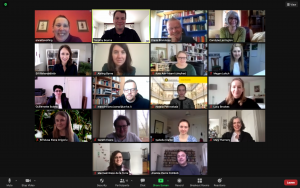On March 25th and 26th, we held our second Emotion and the Medieval Self in Northern Europe workshop, hosted by St John’s College, University of Oxford. This meeting was initially meant to take place in March 2020 and was then postponed to September 2020 and then again to March 2021. Finally, we held the workshop online, via Zoom, and it was immensely productive, energising, and successful!
On the first afternoon, Carolyne Larrington opened the workshop and led a round of general introductions, Sif Ríkharðsdóttir introduced and outlined the wider project, and Timothy Bourns discussed the project’s key terms and working definitions. Following a short break, we turned to the texts themselves; participants were asked to share a passage in advance which they then presented for group discussion. Textual discussions were divided into three sections: French, Celtic, and English (Norse, Dutch, and German were explored at our first workshop in Utrecht in November, 2019). In the opening French Session, we explored passages from Chrétien de Troyes’s Le Chevalier de la Charrette (introduced by Anatole Fuksas, Cassino and Southern Latium), the Carlisle fragment of Thomas d’Angleterre’s Le Roman de Tristan (Brindusa Grigoriu, Alexandru Ioan Cuza), and the non-cyclic Lancelot do Lac (Guillemette Bolens, Geneva). After a concluding discussion, we ended the afternoon with an afternoon social, featuring breakout rooms and a drink of choice!
We began the second day with the Celtic Session – romances in Irish, Scots, and Welsh. More specifically, we examined passages from Eachtra Uilliam (shared by Aisling Byrne, Reading), Hary’s The Wallace (Kate Ash-Irisarri, Bristol), and Ystoria Gereint uab Erbin, especially in conversation with Chrétien’s Erec et Enide (Natalia Petrovskaia, Utrecht). Following a concluding discussion of these passages, a break with breakout rooms, and a lunch break, we began the afternoon with the English Session: Geoffrey Chaucer’s The Wife of Bath’s Tale (Mary Flannery, Bern) and The King of Tars (Lucy Brookes, Oxford). After concluding our discussion of the English passages and another break with breakout rooms, we heard comments and feedback on the project and the workshop from Annette Volfing (Oxford) and had a fruitful concluding discussion about emotions and selfhood in medieval literature. We ended the day with another afternoon social, where we all decided to stay together in one room, where the good conversation and formation of new friendships continued.
We sincerely thank all of the participants for an incredibly instructive, engaging, and enjoyable workshop “in Oxford”, and we hope to stay in touch and see each other in person before long!

